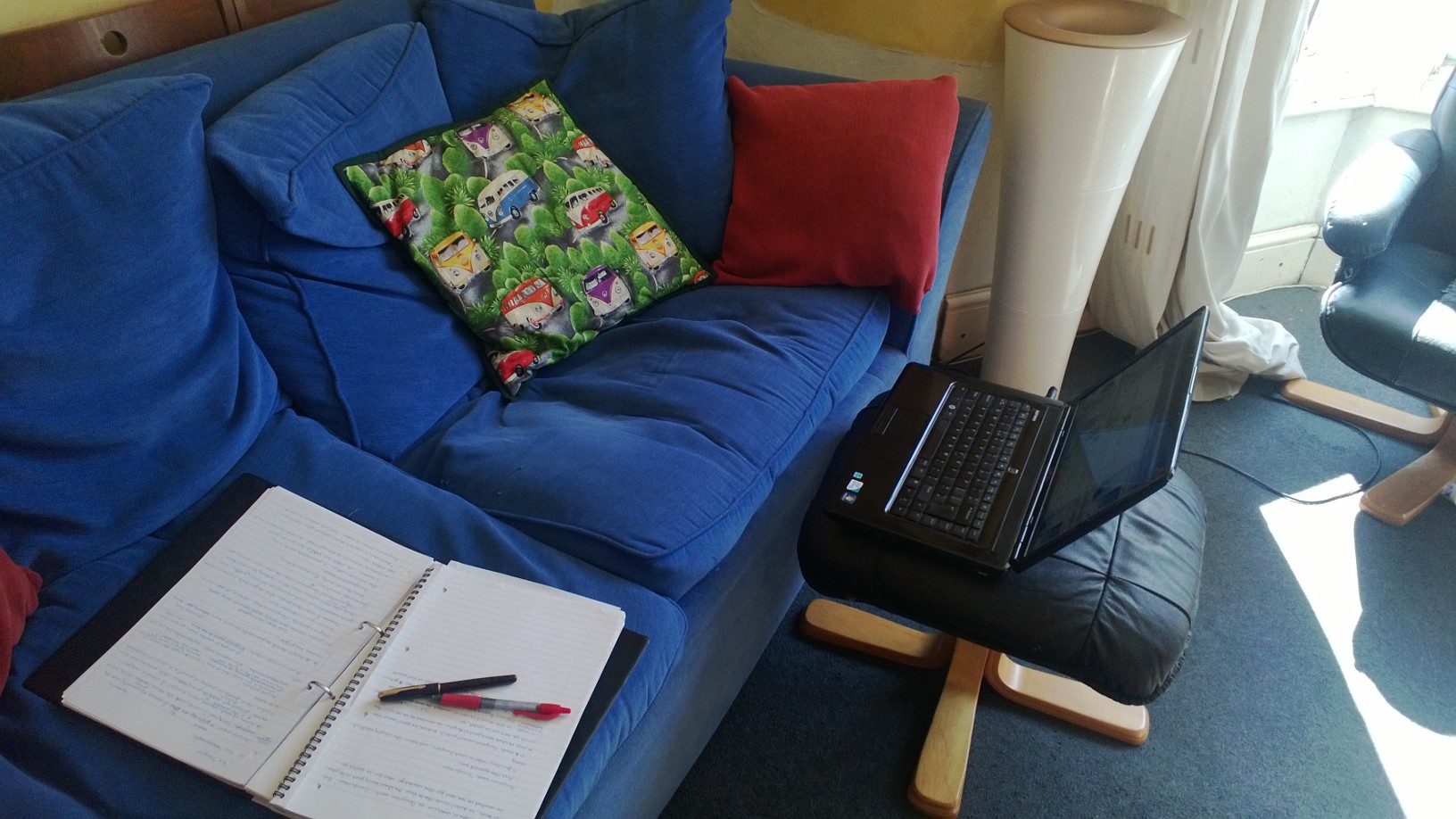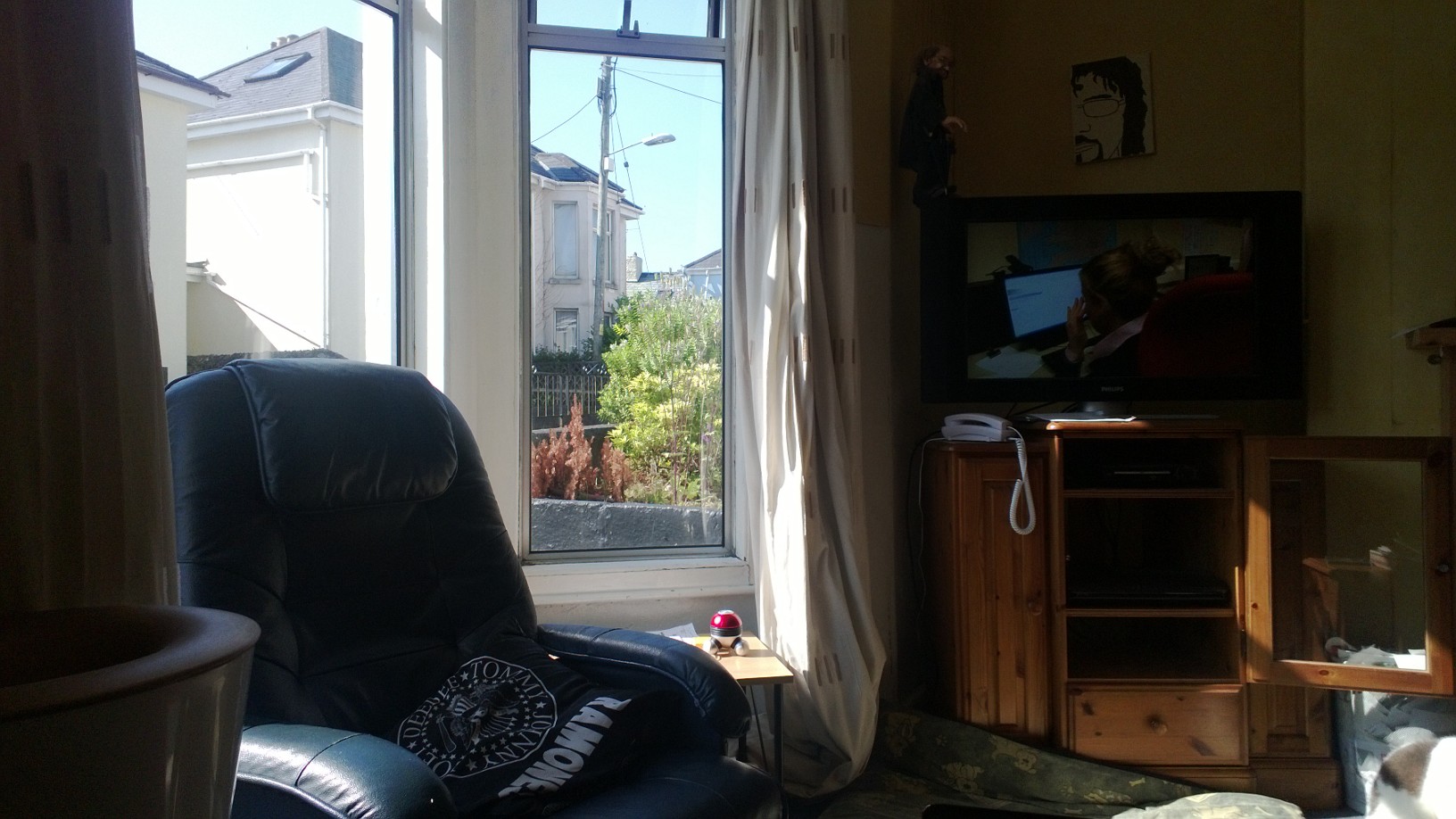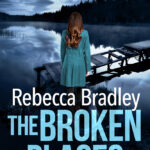Last week I asked if anyone would be interested in answering some set questions about writing that first draft, for a regular slot I intended to have on the blog. I was amazed by the interest that post generated. If you’re interested in guesting on here with your own first draft answers, let me know!
Today I’m excited to welcome our first, first drafter, Annalisa Crawford. Annalisa lives in Cornwall UK, with her husband, two boys, a dog and a cat, and a good supply of beaches and moorland right on her doorstep. Despite the location she neither surfs nor sails, and has never had any inclination to try. She prefers walking along a deserted beach and listening to the waves crashing over rocks. For this reason, shes really loves the beach in the winter!
Over the course of many years, Annalisa has won several competitions, and had short stories published in small press journals. She has two novels that she feels she will probably never publish, one that she’s currently resting, and many more waiting to be written. She is the author of two ebooks, Cat and The Dreamer and That Sadie Thing.
She writes mostly about relationships: romantic, parent-child, waitress-customer, killer-victim, rebellious teenager and her psyche. And is endlessly fascinated with how people treat each other. Her writing has been described as unique and unusual, and no one has been able to put her into a genre yet.
When you decide to write something new, what is the first thing you do?
Firstly, I don’t decide, which is a rubbish way to approach a career, but I wait for the inspiration. Luckily there is always something lurking – a title (as I have at the moment) or a first line. For one story it was a song – every time I heard the song I knew there was a story in my head, but I couldn’t reach it.
Do you have a set routine approaching it?
I work part-time, so I’m lucky that I can wake up in the morning and just start writing. I go to the gym, come home, read emails and Facebook, make a cup of tea, read some more emails… You get the idea. In the middle of all that, some original words of fiction get jotted down.
Pen and paper or straight to the keyboard?
Pen and paper. I have a beautiful fountain pen that I received as a present for my 21st birthday. The words that come from that pen are far superior to the words I write with a Bic.
How important is research to you?
I tend not to write anything that needs research, but my current WIP is set against a backdrop of some serious news events from 2010/2011, so I needed to look them up, write a timeline, view some of the original footage on the BBC (YouTube was amazing for that!). However, that’s the most research I think I’ve ever done!
How do you go about researching?
I avoid it for as long as possible, writing around it, leaving gaps in the MS, before realising that I really need to do it. Then I dive in and get caught up looking at things that have no bearing on the research I need to do. It’s not a good method.
How do you store everything; ideas, research, images that catch your eye?
I have a folder where all the scraps of first drafts get stored, and notebooks. There’s a lot of notes in my margins that read “see red notebook *3”. For research online, I bookmark in folders that I then forget about.
Tell us how that first draft takes shape?
I write random scenes as they appear to me. I’ll usually wake up with a great line and the rest of the scene flows from there. I always write out of order and then fit the scenes into the storyline afterwards. Then I look at what’s missing and slot the plot in between those scenes.
Are there any rituals you have to do or items you must have with you while writing that draft?
Just a lot of angst. Apparently I can’t write without leaning on my elbows, covering my face and screaming inwardly every so often… is that what you meant?
Does the outside world exist or are you lost to us for a period of time as the magic works?
Because of the type of damaged characters I write about, I find myself getting taken over by them, which means the outside world does disappear. After a heavy writing session, I emerge feeling dazed, drained and a bit jet-lagged.
 What does your work space look like?
What does your work space look like?
I used to have a study, which I loved, but it became a teenager’s bedroom. I now write on the sofa in my living room. I have many distractions. But I’ve learnt to write with Diagnosis Murder on the telly and people peering in my very large window as they walk past wondering why I’m inside on such a beautiful day. I also realise I don’t actually look like I’m working – I must look so lazy, sitting in the same spot day after day.
Edit as you go or just keep getting words out?
I was going to say I don’t edit as I go along, what goes on the page stays on the page until the next draft, but what I do do is consider the words very carefully before I write them down. My thesaurus is always close by – if there’s a perfect word, I need to have it, even on the first draft.
I see many writers counting words in a day. Word counter or other method of keeping track of progression?
No. I don’t count words or progress. Some days the words flow so easily I can’t keep up with myself. Other days I spend more time staring into space wondering if I’ve even got a story to tell.

So, that first draft is down. Roughly how long did it take? And what shape is it in?
Anywhere between six weeks and two years. Although at some stage, possibly before I’ve got to a point where other people would consider the first draft finished, I decide to start again. Or to type up the draft I’ve got – so the first, second, third drafts all merge into one. What shape is it in? Hard to tell, because it’s probably in about three different locations – notebook, loose leaf pages, the back of an envelope. It’s certainly not in any kind of order. It’s a mess that I then have to slot together into a meaningful story.
In what format do you like to read it through, ereader, paper or the computer screen?
I don’t read through the first draft, it immediately gets typed up, so I read as I type, and at that point the shape of the MS is more clear. At that point I have to print it out. I used to print out at every stage, but I’ve learnt not conserve paper and now I change the view to full screen reading in Word and possibly change the font to give myself some distance.
What happens now that first draft is done?
As I’ve already explained the term first draft is pretty fluid for me, and interchangeable with the term seventh/eighth draft. At some point though, the physical copy will be set aside, but my head will be working through yet another draft!
Thanks for digging into the depths of the first draft. It’s been a pleasure having you.
It’s been great, Rebecca – you ask some fantastic questions!




I like Annalisa’s no word count policy but pen and paper? Only when I don’t have access to a computer. I do, however, jot things down on whatver scrap If paper I can lay my hands on…when inspiration strikes, one must not trust the memory.
It’s amazing how many perfect sentences can evaporate if you don’t write them down quickly enough. My memory is terrible 🙂
Thanks for letting me be your feature guinea pig. Your questions were brilliant, it was fun answering them 🙂
Great interview. It’s amazing how we are all different in our writing habits. I much prefer to use my laptop than pen and paper. I dislike the look of my writing on paper! It’s probably in part due to the fact that I learnt to type *properly* at around 16/17 and it is much faster! I
That’s why I love my fountain pen so much, it makes my handwriting look so much nicer.
I really enjoyed reading that, it’s always cool to read a fresh perspective on how a writer writes compared to my own method : )
I used to read writing magazines with this kind of interview – I never imagined one day people would be reading about me! 🙂
What a brilliant idea Rebecca and a great interview. It is fascinating to see how other writers work and I can totally relate to people peering in and seeing you sitting in the same place and concluding that you’re just being lazy! 🙂
Sooo interesting to read about someone else’s process! Writer types are so easily distracted I’m amazed we get any writing accomplished at all 😉 Great idea for a post, Rebecca!
Distracted? Nonsense… I’m focussed and… ooh, penguins! 😀
Rebecca – Thanks for starting this series and for ‘introducing’ us to Annalisa.
Annalisa – Thanks for sharing how you go about getting inspired and getting started when you write. It sounds as though you have such a great balance between allowing inspiration to take you where it will and organising yourself and your ideas. I wish you much success.
Thanks Margot – sometimes I ‘think’ far more than I ‘write’ though, I’m a work in progress 🙂
I love the idea of writing with pen and paper—I feel more connected to the words when I do—but I usually can’t read my handwriting. Ugh.
I really enjoyed reading about your process. This is a subject that fascinates me. ☺
That’s exactly how I feel about writing with pen and paper.
I avoid research for as long as possible – funny!!
You need a sign for when you’re in the living room that says Author at Work – Do Not Disturb.
This will be an interesting series, Rebecca. Don’t remember if I volunteered or not…
I think the sign idea is great. I could hang it around my neck so ‘everyone’ knows 🙂
Alex, is this you volunteering?
Fascinating. I would have sworn hand to bible that almost no writers still wrote with pen and paper. Boy am I wrong. I need to read more interviews like this.
Thanks for sharing, Annalisa.
Now I feel very old-fashioned! lol
This will be a good feature. I would love to volunteer to post if you’ve got an opening.
Like Annalisa, I use paper occasionally but only for my research notes and character descriptions. Random observation. Every Brit writer I’ve seen online has Gorgeous! handwriting. 🙂
I remember learning to write at school when I was about five/six and not being allowed lined paper until I could write in straight lines on plain paper!
I can never get enough of hearing about how others write. Thanks for that, Rebecca and Annalisa! 🙂
I love reading interviews like this too. It’s going to be a fun series, isn’t it?
Annalisa, your writing area is so tidy compared to my computer desk/blizzard of notes and paper. Does an organized writing space go hand-in-hand with creativity? Maybe I’ll clean up my desk. It’s fascinating and inspiring to hear about other writer’s techniques and environment. Thanks for the info:)
Because I write in the family room, I have to contain myself and have everything easily pack-away-able if we have visitors. Therefore it’s a necessity to be tidy. When I had a desk I had a blizzard too 🙂
Great to read, Annalisa, and very heartening. I write in scenes too, and often sporadically, putting them altogether later. A kindred spirit! And thanks, Rebecca, this has the makings of a very interesting series:)
I’ve tried to write in a more planned way, but I feel stifled.
My drafts all merge together, too. While I’m writing by hand, I’ll start entering in the computer and printing out the pages. So I’ll be writing, editing it into the computer, and editing the printed pages all at the same time.
Yes, I’ve been known to do that before too. Sometimes I can’t wait to get to the next stage that I try to do all the stages all at once 🙂
This is a great idea for a series!
Loved learning more about Annalisa’s writing process. And I’m glad I’m not the only one who has a sofa as work space!
You have to work with the space you have, Julie, don’t you? 🙂
I can’t wait to read the rest of these posts. I loved hearing about Annalisa’s way of doing things – they felt very different to my own but still recognisable.
Thanks for reading 🙂
I need inspiration before i start, too, and need it for each chapter. http://mpaxauthor.com/blog/
Wouldn’t it be awesome if you could pour inspiration from a tap??
Great interview. I wait for the inspiration to whack me in the head too.
Inspiration seems to whack you frequently, Christine 🙂
Very funny, Annalisa! I’m with you on the angst and inner screaming. Your pen preference is amusing. Great interview! 🙂
I thought the screaming was just me, good to hear I’ve got company 😀
Fantastic interview and great idea. Amazing how similar we are in some things.
I can’t wait to compare myself to the next interviewee in this series!
A great interview!
I do ten minute free-writing, as well as flash fiction under 100 words, by hand.
Any other projects are a mixture of pen/paper and typing.
Writer In Transit
I share so much in common with Annalise, except the writing in pen. I’d like to as i think my brain works better that way, but I forced myself to go straight to the computer in interests of saving time. No matter how we do it, as long as it gets done, right?
I take so long to write anything, time isn’t an issue for me!
I really liked the answer to the special rituals question!
I wish it wasn’t so, but tit always feels like I have to wring the story out of uncooperative characters!
Rebecca – What a great idea, I’m looking forward to the rest of the series.
Annalisa – You make the whole 1st draft process sound organic and peaceful. Not the headless chicken run I made of it! I completely understand the special pen syndrome. I have to have a certain type otherwise I’m doomed. 🙂
I use Scrivener, so not counting words as I write is hard… though I like the idea of not paying attention to that when drafting. Eekkk, my drafts are a mess, but I’ve got it on paper. Editing is what makes it shine:)
I write so concisely (a nice word for sparsely) that if I counted words I’d get far too dispirited!
There are so many people who work from home nowadays, I doubt people passing your windows always assume you’re lazy Annalisa. Just 50% of the time. Thanks for sharing your process with Rebecca, and thanks Rebecca for starting this project. I’m game if you need another guest.
I’m thinking of sticking a “Writer at work” sign on the window, just to make sure 🙂
Annalisa, you did fantastically well here, with both being the first one up with the first draft feature – So a massive thank you! and for replying to all the comments that came through as well. Thank you again! You are a true professional and a star x
You’re welcome. It’s so much fun visiting other blogs. Best of luck with this series 🙂
Enjoyed getting to know you and your writing process a little better, Annalisa 😉
Thanks Ruth 🙂